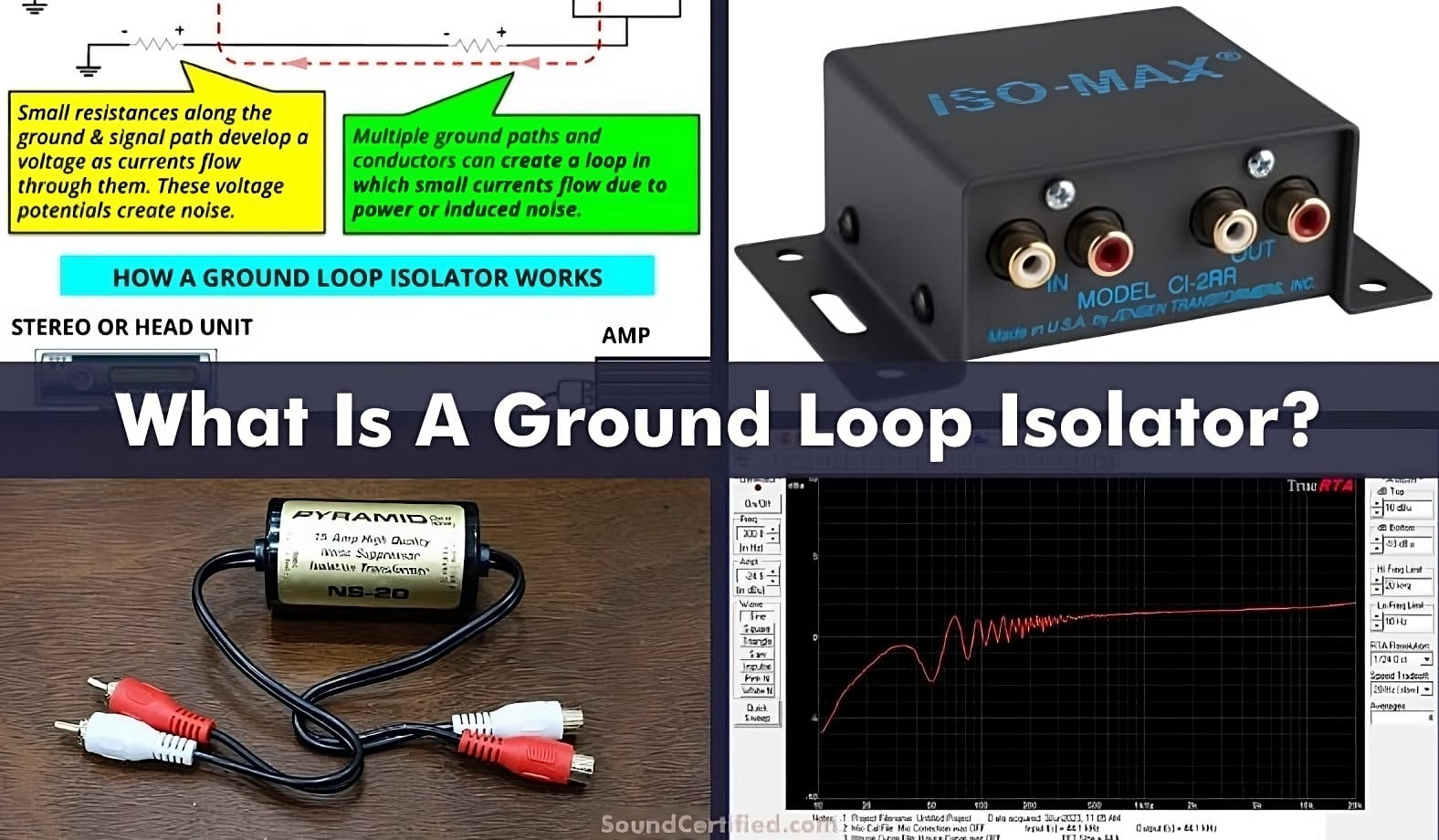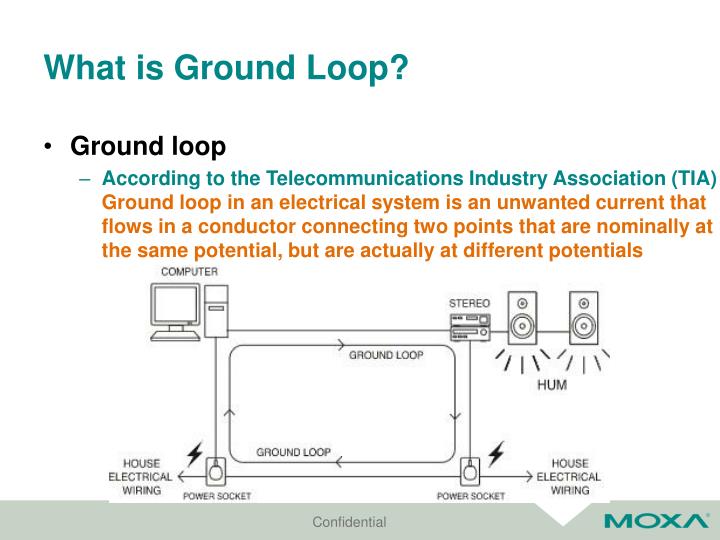Unbelievable Tips About What Is The Ground Loop And How Do You Reduce Its Effect

Understanding Ground Loops
1. What's That Hum? Decoding the Ground Loop Mystery
Ever plugged in your audio gear and been greeted by an annoying hum or buzz instead of sweet music? Chances are, you've met a ground loop. Now, the phrase itself sounds vaguely technical, like something only electrical engineers worry about. But trust me, even if you just want to connect your speakers to your computer without creating an audio nightmare, understanding ground loops can save you a lot of frustration (and potentially your sanity).
At its heart, a ground loop is exactly what it sounds like: an unwanted electrical loop in your grounding system. Think of it like this: electricity always wants to find the easiest path to ground. When you have multiple paths to ground in your audio or electrical setup, you can create a loop. This loop can act like an antenna, picking up stray electromagnetic interference (EMI) from things like power lines, radio signals, and even your own appliances. This interference then gets injected into your audio signal as that dreaded hum. It's a bit like your sound system turning into a radio receiver, but instead of music, you get noise.
The term "ground loop" centers around the noun phrase, focusing on a specific electrical phenomenon. It's the problem we're trying to solve!
So why does this happen? Well, electrical outlets aren't perfectly grounded. There can be slight differences in ground potential between different outlets, even in the same room. These differences, though small, can create a current flow through the ground loop, leading to the hum. Imagine your audio equipment is trying to use two different exits, but one exit has a slight toll. The 'toll' is the difference in ground potential, and it forces current to flow in a loop, creating our audio gremlin.

Diagnosing the Buzz
2. Hunting Down the Source of the Hum
Before you start tearing your setup apart, it's worth confirming that a ground loop is actually the culprit. A simple way to test is by methodically disconnecting components one by one. If the hum disappears when you disconnect a specific piece of equipment, that's a strong indication that it's part of the ground loop. Start with devices connected by audio cables (RCA, XLR, etc.), as these are often the culprits. Think of it like detective work — eliminate the suspects one by one!
Another clue is the nature of the hum itself. Ground loop hum is typically a constant, low-frequency (50Hz or 60Hz, depending on your country's electrical system) tone. It doesn't usually change much with the volume control. Other types of noise, like hiss or crackle, might indicate different problems, like faulty cables or malfunctioning equipment.
Consider the setup. Are you using multiple pieces of equipment plugged into different outlets? Are you using long audio cables? These factors increase the likelihood of a ground loop. Also, ask yourself if you've recently changed anything in your setup. New equipment or even a different outlet can sometimes introduce a ground loop where there wasn't one before. It's like adding a new ingredient to your recipe and suddenly the dish tastes off.
It's important to consider other potential causes before blaming a ground loop. For example, loose connections, poorly shielded cables, or even interference from nearby electronic devices can create similar noise. Before diving into ground loop solutions, ensure your cables are securely connected and that your equipment isn't sitting right next to a noisy appliance like a refrigerator or microwave.

PPT Basic Knowledge Of ESD / EFT Surge Ground Loop PowerPoint
Breaking the Loop
3. Taming the Ground Loop Beast
Okay, so you've confirmed you have a ground loop. Now for the good news: there are several ways to tackle it. The best approach depends on your specific setup, but here are some of the most common and effective solutions. Remember safety first! Always unplug equipment before making any changes to wiring.
1. The Hum Eliminator: These handy devices, also called ground loop isolators, use transformers to break the direct electrical connection between the input and output signals, effectively isolating the ground paths. They're relatively inexpensive and easy to install, making them a popular choice. Think of them as a tiny electric moat, preventing the ground loop current from flowing.
2. Single Point Grounding: The idea here is to create a single, central ground point for all your equipment. This can be achieved by plugging everything into the same power strip or using a dedicated grounding block. This minimizes ground potential differences between devices. It's like getting everyone to agree on one meeting spot instead of having people wander around aimlessly.
3. Balanced Audio Cables (XLR): If possible, switch to balanced audio connections (XLR) instead of unbalanced ones (RCA). Balanced connections are designed to reject common-mode noise, which includes ground loop hum. They use a clever trick where any noise picked up along the cable is cancelled out at the receiving end. It's like having noise-canceling headphones, but for your audio cables!
4. Lifting the Ground (Proceed with Caution!): As a last resort, you could try lifting the ground on one piece of equipment using a ground lift adapter (also known as a "cheater plug"). However, this is generally discouraged because it can create a safety hazard by removing the protective ground connection. Only consider this if you absolutely know what you're doing and understand the risks involved. Never do this on equipment with a metal chassis. Seriously, don't. Safety first!

What Is A Ground Loop In Electronics
Beyond the Basics
4. Digging Deeper into Ground Loop Issues
Sometimes, the standard solutions aren't enough to completely eliminate a ground loop. In these cases, you might need to do some more advanced troubleshooting. This could involve checking the grounding of your electrical outlets, using a multimeter to measure ground potential differences, or even consulting with a qualified electrician. It's like calling in the pros when your DIY skills reach their limit.
Consider the environment. Are there any nearby sources of electromagnetic interference that could be contributing to the problem? Things like fluorescent lights, transformers, and radio transmitters can all generate EMI. Try moving your equipment away from these sources or shielding it with metal enclosures. Sometimes, simply rearranging your setup can make a big difference. Think of it like redecorating to improve the feng shui of your audio system!
Examine your cables. Are they in good condition? Are they properly shielded? Poorly shielded cables can act like antennas, picking up noise and injecting it into your audio signal. Consider upgrading to higher-quality cables with better shielding. It's like investing in a good raincoat — it'll protect you from the noise!
Don't overlook the obvious. Sometimes, the problem isn't a ground loop at all, but simply a faulty component. Try swapping out cables, power supplies, or even entire pieces of equipment to see if the noise disappears. It's like ruling out the most obvious suspects before diving into a complex investigation.

What Is A Ground Loop Issue At Will Jarman Blog
Frequently Asked Questions (FAQ)
5. Clearing Up Common Confusion
Still scratching your head? Let's tackle some frequently asked questions about ground loops.
Q: Will a power conditioner solve my ground loop problem?
A: It might help, but it's not a guaranteed solution. Power conditioners primarily filter out voltage spikes and noise on the power line, but they don't always address ground loop issues. They can, however, improve the overall quality of your power, which can indirectly reduce noise. Think of it as preventative medicine for your electrical system.
Q: Can I just cut the ground wire on my power cord?
A: Absolutely not! This is extremely dangerous and can create a serious shock hazard. The ground wire is there to protect you from electrical faults. Tampering with it is never a good idea. It's like removing the airbags from your car — a bad idea!
Q: Are ground loops only a problem with audio equipment?
A: No, ground loops can affect any electronic equipment that uses grounding, including video equipment, computers, and even sensitive scientific instruments. They're a general issue related to grounding practices. It's like weeds in a garden — they can pop up anywhere!
Q: My equipment is double-insulated (no ground pin). Can I still have a ground loop?
A: Yes, even if your equipment is double-insulated and doesn't have a ground pin on the power plug, a ground loop can still occur through other connections, such as audio cables or network cables. The key is the multiple paths to ground, regardless of the power cord.
Q: What if I've tried everything and still have a hum?
A: Sometimes, persistent hum issues require professional help. An experienced audio technician or electrician can diagnose the problem and recommend the best course of action. It's like calling in a plumber when you have a really stubborn leak.
